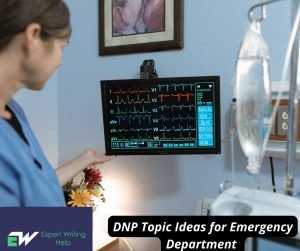Differentiating Nursing Research, Evidence-Based Practice and Quality Improvement
As the healthcare systems become more complex, the more the focus on patient experience expands. Nurses have taken the leading role and participated in nursing research studies, evidence-based practice projects, and quality improvement initiatives to improve patient outcomes.
Nursing research, evidence-based practice, and quality improvement all work to support the three main goals of the Magnet Recognition Program and the Magnet Model component of new knowledge, invention, and development. The three main goals of the Magnet Recognition Program include:
- Promote quality in a setting that supports the professional practice
- Identify excellence in the delivery of nursing services to patients
- Disseminate best practices in nursing services
The Magnet Model, on the other hand, includes the following five components:
- Transformational leadership
- Structural empowerment
- Exemplary professional practice
- New knowledge, innovation, and improvements
- Empirical quality outcomes
To attain the goals of the Magnet Recognition Program and the new knowledge innovation and improvement elements of the Magnet Model, nurses at al levels of the healthcare system must work as a unit. However, nursing research, evidence-based practice (EBP), and quality improvement (QI) has subtle differences; thus, they often overlap, making it difficult for nurses to identify the best option for investigating a clinical problem.
This article will explain the basic differences among nursing research, evidence-based practice, and quality improvement to make it easy for nursing students to know the differences and choose the best option when investigating a clinical problem.
Understanding Nursing Research
The main aim of conducting nursing research is to produce new knowledge or to confirm existing knowledge based on theory. Nursing research involves systematic, scientific inquiry to answer particular research questions or test hypotheses using rigorous and controlled procedures.
Even though nursing research involves investigation, exploration, and innovation, it needs a clear understanding of the philosophy of science. For nursing research findings to be valid and reliable, researchers must use the scientific method in sequential steps.
The research process starts with a compelling question(s) about a specific issue. For instance, what do you know about the phenomenon? What evidence is available or reported? What gaps are there in the knowledge base?
The investigation part of the nursing research involves a systematic, in-depth review of the literature to answer the compelling questions. The identified knowledge gaps often offer the motivation for developing a specific research question(s), a hypothesis, or a hypothesis. A decision can then be made on the primary theory that will lead the Research and help select the methodology to examine the issue.
Nursing research has two main study methods: qualitative (verbal) and quantitative (numeric). However, mixed methods that use both qualitative and quantitative are becoming popular. Whereas the quantitative approach seeks to examine the relationships among a set of variables related to the issue under investigation, qualitative studies aim to establish an in-depth meaning of involved variables.
Ideally, quantitative studies involve scientific methods to determine suitable sample sizes, different designs to control for potential errors, especially during data collection, and extensive statistical data analysis.
In nursing research, discoveries are made as data is collected and analyzed, and results and outcomes are interpreted. The final phase in the research process is the publication of study findings with a description of how the findings contribute to the body of knowledge.
Understanding Evidence-based Practice
Whereas nursing research is about discovering and developing new knowledge or authenticating existing knowledge, writing evidence-based practice (EBP) involves translating evidence and applying it to clinical decision-making. EBP aims to use the best evidence available to make informed patient-care decisions, and as such, the best evidence comes from Research. However, EBP goes further to use the Research and involves clinical expertise, patient preferences, and values.
Moreover, the use of evidence-based practice considers that the best evidence can be that of opinion leaders and experts, although no conclusive information from Research exists. While Research involves the development of new knowledge, evidence-based practice entails innovation that is based on finding and translating the best evidence into clinical practice.
Steps in the Evidence-based Practice Process
The evidence-based practice has seven critical steps:
- Cultivate a spirit of inquiry
- Ask a compelling clinical question
- Collect the most relevant and best evidence
- Critically appraise the evidence
- Integrate with clinical expertise, patient preferences, and values in making a practice decision or change
- Evaluate the practice decision or change
- Disseminate EBP results
Nurturing a spirit of inquiry means that collectively or individually, nurses should always be questioning how to enhance healthcare delivery. A compelling clinical question is often initiated through either a knowledge-focused or problem-focused. Problem-focused initiators may emerge from identifying a clinical problem or areas of risk management or quality improvement. On the other hand, knowledge-focused initiators may arise from new research or literature findings, new theories and philosophies of patient care, or new regulations.
Irrespective of the origin of the cultivating question, the next step in evidence-based practice is reviewing and appraising the literature. A literature review for Research often involves identifying gaps in knowledge, but in EBP, a literature review is done to find the best current evidence.
Hierarchy of Evidence in Evidence-based Practice
When searching for the best available evidence, nurses must understand that a hierarchy exists concerning the level and strength of evidence available. The different rankings of evidence available are the same to some degree.
- The strongest or highest level of evidence basically comes from a systematic review, meta-analysis, or a developed evidence-based clinical practice guideline based on a descriptive review.
- The other levels of evidence are obtained from randomized controlled trials (RCTs), others types of quantitative studies, qualitative studies, and expert opinions and analyses.
Critical Appraisal
Once the evidence is collected, the researcher must critically appraise each study to guarantee its credibility and clinical importance. Critical appraisal is tedious and time-consuming, but it is crucial to determine what was done and how well it was done. Conducting essential assessment aims to answer the following key questions:
- What were the results of the study? What is the evidence?
- How valid are the results? Can the results be trusted?
- Will the results be helpful in caring for other patients? Are they transferable?
Final Steps of Evidence-based Practice
The last step of the evidence-based practice process includes integrating the evidence with one’s clinical expertise while considering the patient preferences and evaluating the effectiveness of applying the evidence. Publishing or reporting the outcomes of EBP projects can help others learn about and use the best evidence.
Understanding Quality Improvement (QI)
Quality Improvement (QI) aims to use a systematic, data-led approach to improve processes and results. The principles and strategies involved in QI have advanced from organizational philosophies of complete quality management and progressive quality improvement.
Even though the concept of quality can be subjective, quality improvement in the healthcare system basically focuses on improving patient outcomes. Therefore, it is essential to clearly define the outcome that requires improvement, identify how the outcome will be measured, establish a plan for implementing an intervention, and gather data before and after the intervention.
Quality Improvement Methods
Different quality improvement methods are available. However, a popular format uses the acronym FOCUS-PDSA:
- Find a process to improve
- Organize an effort to work on improvement.
- Clarify current knowledge of the process.
- Understand process variation and performance capability
- Select changes aimed at performance improvement
- Plan the change, analyze existing data, and predict the results.
- Do it; execute the plan.
- Study (analyze) the new data and check the results.
- Act; take action to sustain the gains.
Unlike EBP and Research, quality improvement basically does not require in-depth literature reviews and rigorous critical assessment. Nurses can be much more involved in QI projects than in evidence-based practice or Research. Moreover, Quality Improvement projects normally are site-specific, and results are not aimed at providing generalizable knowledge or best evidence. For instance, QI projects can include implementing a process to remove urinary catheters within a certain period, developing a strategy to improve wound-care documentation, and improving the process for patient education for a specific chronic disease.
Conclusion
If you are unsure about which practice, policy, or procedure is best, a research project can help generate this knowledge. However, because the best approach, process, or method is not yet known, it is prudent and ethical to assign some nurses to receive one and some to receive another through randomization or other means of assignment to a control group.
Remember:
- Nursing research, QI, and EBP all aim to support the three primary goals of the Magnet Recognition Program and the Magnet Model elements of new knowledge, innovation, and improvements.
- The nursing research uses a methodology – qualitative or quantitative to develop new knowledge.
- EBP finds and uses the best quality clinical evidence from nursing research to make informed patient-care decisions
- QI involves systematic processes to improve patient outcomes
Therefore, all nurses must know and understand the differences among these three concepts for excellent delivery of nursing services to patients, promote the high-quality professional practice, and expend best practices in nursing services.
Additionally as a DNP student your required to know the distinctive features of nursing research, evidence-based practice, and quality improvements to guide you in crafting your project to impact patient outcome.
Incase your facing scholarly challenges get in touch with expert DNP project writers for assistance with writing EBP or quality improvement projects.
Give us a call today and get the best tutoring and nursing assignment services!

 Over time, tons of theories have been and are being developed. And the medical field has not been left behind. Understanding theories is a major part of the advancement of the discipline. Taking it down the foundation of theories, a theory is a supposition or a system of ideas intended to explain something, especially one based on general principles independent of the thing to be explained.
Over time, tons of theories have been and are being developed. And the medical field has not been left behind. Understanding theories is a major part of the advancement of the discipline. Taking it down the foundation of theories, a theory is a supposition or a system of ideas intended to explain something, especially one based on general principles independent of the thing to be explained.

 If you enroll for Doctor of Nursing Practitioner in emergency nursing specialization, your studies will culminate in writing capstone project. The capstone project should be written according to AACN essentials and DNP guidelines of your school in order to obtain excellent grades. If you need assistance with writing and editing emergency nursing capstone project check our
If you enroll for Doctor of Nursing Practitioner in emergency nursing specialization, your studies will culminate in writing capstone project. The capstone project should be written according to AACN essentials and DNP guidelines of your school in order to obtain excellent grades. If you need assistance with writing and editing emergency nursing capstone project check our 

 To complete and graduate as a doctorate in nursing you need 33 to 43 credits and at least 500 clinical practice hours. This is equivalent of 2 years full time coursework. It is estimated that
To complete and graduate as a doctorate in nursing you need 33 to 43 credits and at least 500 clinical practice hours. This is equivalent of 2 years full time coursework. It is estimated that  Well, an evaluator always wants to be taken from point A to point B through a process that they can follow and hopefully agree with. Have in mind that the evaluator is conversant with the topic at hand. In light of this, you need to set high standards that will give an affirmation that you know what you are doing. Normally, when writing these types of projects, you will need to give a thesis or hypothesis and that will be the guiding statement that you will run with all through. It helps you remain relevant to your topic and sets you up for the perfect close.
Well, an evaluator always wants to be taken from point A to point B through a process that they can follow and hopefully agree with. Have in mind that the evaluator is conversant with the topic at hand. In light of this, you need to set high standards that will give an affirmation that you know what you are doing. Normally, when writing these types of projects, you will need to give a thesis or hypothesis and that will be the guiding statement that you will run with all through. It helps you remain relevant to your topic and sets you up for the perfect close.
 Are you a nursing student looking for comprehensive guide on how to write PICO question? Academic papers mark quite a significant time and especially when they are your final papers they mark the threshold of your current academic pursuit, but before we jump into graduation day, let’s first figure out how to grab some A grades. Truth be told, nursing is not rated as one of the easiest studies in today’s curriculum but it is one of the most lucrative ones all over the globe. This is why you don’t need to take chances on anything at all, you have to perfect on your skill to be at the top of your game.
Are you a nursing student looking for comprehensive guide on how to write PICO question? Academic papers mark quite a significant time and especially when they are your final papers they mark the threshold of your current academic pursuit, but before we jump into graduation day, let’s first figure out how to grab some A grades. Truth be told, nursing is not rated as one of the easiest studies in today’s curriculum but it is one of the most lucrative ones all over the globe. This is why you don’t need to take chances on anything at all, you have to perfect on your skill to be at the top of your game.




 A DNP capstone project aims to involve doctor of nursing practice students in real-world nursing care issues. The project provides you with an exciting opportunity to demonstrate your in-depth knowledge and skills in addressing these problems. It also offers you a chance to showcase your mastery of the nursing specialty you are studying. Most likely, this project is going to be one of the most critical ones you will ever handle. You want to start planning as soon as you join your DNP program and stay the course until you finish it. Searching online to learn how to write quality DNP capstone project? You are at the right place.
A DNP capstone project aims to involve doctor of nursing practice students in real-world nursing care issues. The project provides you with an exciting opportunity to demonstrate your in-depth knowledge and skills in addressing these problems. It also offers you a chance to showcase your mastery of the nursing specialty you are studying. Most likely, this project is going to be one of the most critical ones you will ever handle. You want to start planning as soon as you join your DNP program and stay the course until you finish it. Searching online to learn how to write quality DNP capstone project? You are at the right place.




 Are you looking for tips on writing good nursing capstone paper? Every nursing student is required to write a capstone paper as a partial fulfillment to attaining a nursing degree in American, British, Australian, Oman or Canadian colleges. It can be quite frustrating for a student who has not mastered the art of writing capstone proposals and projects. However, this article seeks to impart necessary knowledge in developing a quality nursing paper.
Are you looking for tips on writing good nursing capstone paper? Every nursing student is required to write a capstone paper as a partial fulfillment to attaining a nursing degree in American, British, Australian, Oman or Canadian colleges. It can be quite frustrating for a student who has not mastered the art of writing capstone proposals and projects. However, this article seeks to impart necessary knowledge in developing a quality nursing paper. The moment you pick a subject, the next step should be creating a strong thesis statement. This is an essential, foundational element for a valid paper. One assurance of setting up a successful argument is that you take a definite point of view. The thesis statement must be clear and able to express one main idea, and it should be about the subject that permits further discussion. A good thesis statement must be genuine, compelling and gives the reader the urge to continue reading.
The moment you pick a subject, the next step should be creating a strong thesis statement. This is an essential, foundational element for a valid paper. One assurance of setting up a successful argument is that you take a definite point of view. The thesis statement must be clear and able to express one main idea, and it should be about the subject that permits further discussion. A good thesis statement must be genuine, compelling and gives the reader the urge to continue reading. In your research paper, you need to give proper credit to all data and reference you use in your paper. Specific requirements for citing the sources can vary depending on the instructions given. Whether you are working in the
In your research paper, you need to give proper credit to all data and reference you use in your paper. Specific requirements for citing the sources can vary depending on the instructions given. Whether you are working in the